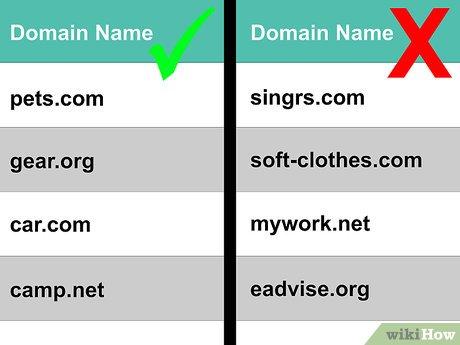Table of Contents
- Understanding the Domain Flipping Landscape and Its Opportunities
- Key Strategies for Identifying Profitable Domains to Flip
- How to Effectively Market and Sell Your Domain for Maximum Profit
- Navigating the Legal Aspects of Domain Flipping
- Building a Sustainable Domain Flipping Business Model
- Q&A
- Final Thoughts


Understanding the Domain Flipping Landscape and Its Opportunities
The domain flipping industry offers a vibrant ecosystem full of potential. As the internet expands, so does the value of unique and memorable domain names. Entrepreneurs and investors alike are tapping into this market, recognizing that the right domain can significantly impact a business’s visibility and credibility. Key factors driving this landscape include:
- Market Demand: Businesses are constantly seeking to establish a strong online presence, which increases the demand for catchy, relevant domain names.
- Brand Recognition: A well-chosen domain can enhance brand identity, making it easier for customers to remember and visit.
- Investment Opportunities: Savvy investors have turned domain names into assets, flipping them for a profit as their value increases over time.
Understanding the dynamics of supply and demand is crucial for successful flipping. Buyers are often looking for domains that provide good SEO potential, brand relevance, or simply a short, appealing name. By focusing on trends and emerging markets, you may uncover opportunities that others have missed. The following attributes can add value to a domain:
| Attribute | Description |
|---|---|
| Length | Shorter domains are generally more desirable. |
| Keywords | Including popular keywords can boost search visibility. |
| Extension | Choose between popular TLDs like .com, .net, or niche TLDs based on market demand. |
The flipping process requires not only an eye for valuable domains but also a strategic approach to purchasing and marketing them. Engaging with online communities, utilizing domain appraisal tools, and monitoring market trends can provide invaluable insights. Once you acquire a domain, the way you present and promote it can significantly affect its resale value. Effective techniques include:
- Creating a Catchy Landing Page: A well-designed landing page can attract potential buyers.
- Utilizing Social Media: Share your domains through various platforms to reach a broader audience.
- Network with Industry Professionals: Building connections can lead to referrals and exclusive opportunities.


Key Strategies for Identifying Profitable Domains to Flip
When searching for domains that can yield a substantial profit, it’s essential to focus on several key indicators that reveal potential value. First, consider keyword relevance; domains rich in popular keywords related to trending industries hold a competitive edge. Check keyword tools to evaluate search volume and competition. Additionally, length and memorability play crucial roles. Shorter domains are easier to remember and share, making them more attractive to potential buyers. In this context, aim for domains that are under 15 characters, ideally with .com extensions, as they are often perceived as more credible.
Another pivotal strategy is to assess the domain’s history. Use tools such as the Wayback Machine or domain research platforms to dig into previous ownership, content, and any penalties. Avoid domains associated with spam or negative reputation, as they may come with undesirable baggage. Create a table to track vital historical elements:
| Criteria | Importance |
|---|---|
| Previous Use/Content | High |
| Backlink Profile | Medium |
| Social Media Presence | Medium |
| Penalty Status | High |
Additionally, consider the market trends and buyer demand within various niches. Utilize platforms like Google Trends and forums related to domain selling to foresee the domains that are gaining traction. Tracking what specific industries are getting attention can help you tap into emerging markets before they become saturated. Always keep an eye on industry news to anticipate shifts that could influence domain value, allowing you to make informed purchases that can later be flipped for profit.
How to Effectively Market and Sell Your Domain for Maximum Profit
To maximize your profit when flipping domains, you must first identify the right domain to invest in. Look for names that are catchy, relevant, and easy to remember. Consider the following attributes:
- Keyword-rich: Domains that include popular keywords can rank better in search engines.
- Length: Shorter domains are usually more desirable as they are easier to type and remember.
- Brandability: A domain that sounds like a brand name has more potential for resale.
After acquiring a domain, the next step is effective marketing. Showcase your domain on various platforms to reach potential buyers, including:
- Domain marketplaces: Websites such as Sedo, Flippa, and GoDaddy Auctions provide a dedicated space to list your domains.
- Social media: Use Twitter, Facebook, and LinkedIn to promote your domains to relevant audiences.
- Networking: Join online forums and communities where buyers and sellers congregate.
pricing your domain competitively is crucial. Analyze similar sales to determine a reasonable price, and consider using the following table to strategize your listing:
| Domain Type | Price Range | Sell Timeframe |
|---|---|---|
| Premium Short Domains | $1,000 – $10,000+ | 1 month – 6 months |
| Keyword Domains | $500 – $3,000 | 1 month – 1 year |
| Brandable Domains | $100 – $2,000 | 3 months – 12 months |


Navigating the Legal Aspects of Domain Flipping
When engaging in domain flipping, understanding the legal landscape is crucial to navigate potential pitfalls and secure successful transactions. One of the foundational aspects to consider is trademark law. Before purchasing a domain, it’s essential to conduct thorough research to ensure the name does not infringe on any existing trademarks. Using tools like the United States Patent and Trademark Office (USPTO) database can help identify existing trademarks that may conflict with your intended domain.
Another critical legal consideration relates to domain registration and ownership. Ensure that the acquisition process follows the proper guidelines set by domain registrars. This includes verifying that the current owner is the legitimate holder of the domain and has the right to sell it. It’s advisable to use an escrow service during transactions to safeguard your investment and facilitate a smooth transfer of ownership. Additionally, keeping accurate records of communication and agreements can protect against future disputes over ownership or payment issues.
Contractual obligations also play a significant role in domain flipping. Having a well-drafted purchase agreement spells out the terms of the sale, including price, payment methods, and what happens in the case of disputes. Elements to include are:
- Purchase Price: Clear specification of the amount
- Transfer Conditions: Detailed steps for transferring the domain
- Dispute Resolution: Steps to resolve potential conflicts
Investing in legal guidance can enhance your understanding of these components and help mitigate risks effectively, allowing you to capitalize on your flipping opportunities with confidence.


Building a Sustainable Domain Flipping Business Model
To create a thriving domain flipping business, it’s essential to start with a solid foundation. This begins with thorough research of the domain market. Knowing which niches are trending can significantly enhance your chances of acquiring valuable domains. Focus on domains that have existing traffic or potential brand appeal. Some key aspects to evaluate include:
- Keyword Relevance: Choose domains that contain popular search terms.
- Domain Authority: Analyze metrics using tools like Moz or Ahrefs.
- Length and Simplicity: Short, memorable domains attract higher offers.
Once you’ve identified potential acquisitions, consider implementing a sustainability model for your flipping endeavors. This involves continuously engaging in the acquisition and selling process while maintaining a focus on long-term growth. Implement a cycle of:
- Domain Acquisition: Invest strategically in domains with potential.
- Market Evaluation: Regularly assess market trends and pricing strategies.
- Community Engagement: Network with other domain investors for insights and collaboration.
By cultivating a sustainable approach, you not only maximize your profits but also build a reputable brand within the domain flipping community. Furthermore, keeping accurate records can aid in refining your methods over time. Using a simple tracking table can help you monitor your growth:
| Domain Name | Purchase Price | Sale Price | Profit |
|---|---|---|---|
| example1.com | $100 | $500 | $400 |
| example2.net | $50 | $300 | $250 |
| example3.org | $200 | $600 | $400 |
This understanding of tracking your acquisitions will enhance your ability to identify patterns, enabling informed decision-making for future flips and fostering an efficient operational framework in your business.
Q&A
Q&A: Flipping Domain Selling
What is domain flipping?
Domain flipping is the practice of buying domain names at a low cost and then reselling them at a higher price for profit. This often involves seeking out valuable or trendy domain names that have the potential to attract buyers due to their relevance, uniqueness, or branding opportunities.How do I get started with flipping domains?
To start flipping domains, you’ll need to:- Research: Identify trends and keywords in your niche that are likely to attract attention. Use tools like Google Trends or keyword planners to discover what people are searching for.
- Choose a registrar: Select a reliable domain registrar where you can purchase and manage your domains.
- Purchase domains: Look for undervalued or expired domains that have potential resale value. Make your purchases wisely based on your research.
- Market your domains: Create listings for your domains on popular marketplaces or your own website.
What makes a domain name valuable?
Several factors contribute to a domain’s value:- Length: Shorter domain names are generally more valuable due to their memorability.
- Keywords: Domains that include popular keywords relevant to a specific niche can attract more buyers.
- Brandability: A domain that’s easy to spell and pronounce is more likely to be successful in branding efforts.
- TLD (Top-Level Domain): The extension of the domain (.com, .net, .org, etc.) can impact value, with .com usually being the most sought after.
Is domain flipping a profitable venture?
Yes, domain flipping can be profitable, but it requires research, skill, and sometimes a bit of luck. Many domain flippers have turned modest investments into significant profits by identifying the right domains at the right time. However, not every domain will sell, so it is essential to have a strategy in place.What are common mistakes to avoid when flipping domains?
- Neglecting research: Failing to research market demand and trends can lead to poor purchases.
- Overpricing domains: Setting prices too high can deter potential buyers. Pricing should reflect the current market.
- Not having a marketing plan: Simply listing a domain without a promotional strategy will limit visibility. Use social media, SEO, or domain marketplaces to reach a wider audience.
- Ignoring domain renewal fees: Make sure to factor in ongoing costs associated with domain ownership to avoid losing profit on any sales.
How can I effectively sell my domains?
To sell your domains effectively:- List on reputable marketplaces: Utilize platforms like GoDaddy Auctions, Sedo, or Flippa to reach serious buyers.
- Craft compelling descriptions: Write engaging, keyword-rich descriptions that highlight the benefits and potential uses of the domain.
- Utilize social media: Share your domains on social media platforms and forums to increase visibility and attract potential buyers.
- Be responsive: Quickly respond to inquiries and offers to demonstrate professionalism and encourage sales.
What are the legal considerations involved in domain flipping?
When flipping domains, it’s essential to:- Check trademark issues: Ensure the domain doesn’t infringe on existing trademarks, as this can lead to legal consequences.
- Respect copyright: Avoid domains that include copyrighted terms or names.
- Follow marketplace rules: Adhere to the guidelines set by platforms you use to sell domains to avoid account suspension.

